Environmental Stewardship
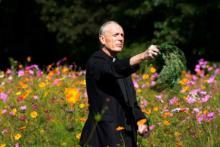
Growing up in small-town Georgia, John B. Johnson had family friends who ran the funeral home down the street, so the particulars of a typical American funeral — the embalming, the heavy casket, and remarks about how great the deceased’s hair looked — were all familiar to him.
When the time came, he assumed, his funeral would look much the same.
But Johnson, now 44, envisions a different sort of send-off for himself: a “green burial” that draws both upon his faith and his commitment to the environment. For Johnson and others like him, a green burial is a way to care for the Earth and answer to the part of his soul that recoils at the pomp of the average American funeral, and takes seriously the biblical reminder: “For dust thou art, and unto dust shalt thou return.”
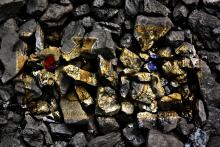
I’ll be upfront and admit it. When I heard about the chemical spill that shut down the water supply for 300,000 of my fellow West Virginians, I felt an odd tug of relief. “Maybe now something will get straightened out,” I thought to myself.
Sure, what I felt might sound callously unfeeling. After all, the chemical spill closed down businesses and schools, shut down bathing, and reduced populations to scrapping for potable water. Happily, thousands of neighbors and outliers pitched in to deliver water from bottles to tankers to the beleaguered people.
Welcome, world, to West Virginia, your national energy sacrifice state. Our state has a king — name’s Coal. Just as in Nebuchadnezzar’s era (Daniel 3), on cue politicians, business people, and media outlets bow their knee to King Coal lest their fates be a metaphorical fiery furnace.
Before readers think I’m off-track, let me first back up.
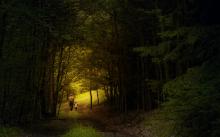
When you hear about stewardship in church, you probably think of your checkbook. Stewardship is the term we use to talk about financially supporting our churches and organizations. But another holy use of the word involves being stewards of creation.
When I hear the word stewardship, I feel the crunch of snow and branches under my feet. I see the trees and paths of the woods owned by my parents’ best friends, where I spent much of my childhood hiking, hunting, skiing, picking apples, and feeding chickadees out of the palm of my hand. It’s one of the places where I gradually heard my calling to work for the care of creation. And the word stewardship transports me to a specific day in my childhood, walking in the woods with my dad’s best friend, Leo, when he pointed to a tree and said he would have to take it down.
How could he kill a tree? I hassled him; I got indignant. I said that nature should be left alone to do her thing. But Leo explained that I was wrong — he managed the land. It wouldn’t be just fine on its own; rather, it needed his careful eye to manage the trails, cut down sick trees, and hunt deer.
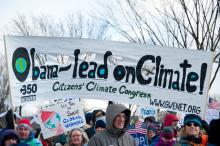
PHYSICS IS IMPLACABLE—it won’t bend even to politics.
Which is why it comes as bad news to see the charts on U.S. production of fossil fuels. During the Obama years, even as the president has been touting his administration’s success in reducing our domestic carbon emissions, it turns out that we’ve been drilling, mining, and fracking for more oil, coal, and gas than ever before. In fact, we’ve passed Saudi Arabia in oil production and are about to pass Russia in oil and gas output combined; meanwhile our coal exports have reached new highs. We’ve become the world’s biggest fossil fuel producer.
Which means that, precisely in the years when it’s become clear how much damage climate change is doing—the years of Midwest drought, of Hurricane Sandy—the United States has been bucking physics. We’re going in exactly the wrong direction.
The White House might make two arguments in response. One, it’s not their fault: The oil boom in places like North Dakota is all private enterprise. But in fact Obama’s done much to grease the skids for this boom: He’s opened up big offshore tracts for drilling, and even let the oil companies into the Arctic. His Interior Department has held auctions for vast piles of Powder River Basin coal.
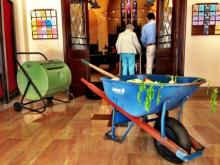
The wheelbarrow outside the sanctuary was overflowing with vegetable scraps; decomposing matter filled the baptismal font; and a pile of rich brown soil replaced the Communion table.
Ashley Goff, minister for spiritual formation at Church of the Pilgrims, wanted to convey a message about the cycle of nature this fall, and she could think of no better analogy than the congregation’s growing enchantment with compost.
“I wanted them to see the process of life and death and change,” she said of her Presbyterian Church (USA) congregation of 70. “It’s a dying and a rising, where new life begins.”
Across the country in the past decade, hundreds of houses of worship have started composting, relating it to theological concepts of resurrection and stewardship.

This past Sunday, I had the opportunity to watch our children’s ministry present through play, song, and dance the story of the birth of Jesus Christ.
No matter how many times I have seen this story, it’s always amazing that this miracle that happened in a manger could have such a huge impact on the lives of so many. Jesus was not born with a silver spoon in his mouth, his parents did not have the best reputation, and he definitely wasn’t birthed in a fancy hospital. Instead, he was born where animals were kept — not the best conditions environmentally at all! Further, Jesus Christ became an advocate for the poor, for those that do not always have a voice, and for those that were suffering from terrible mistreatment, disease, and sickness.
I truly believe that Jesus’s focus on the “least of these” is a model for advocacy, especially for the environmental justice movement.
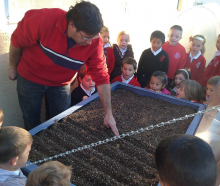
Online resources
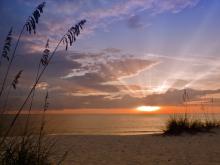
Editor's Note: New Vision Renewable Energy connects Christians with opportunities to provide renewable solar lights to people in the developing world. Their Christmas Lights Advent Devotional features daily readings and questions from prominent Christian thinkers, including Sojourners president Jim Wallis. This Day 10 of Advent devotional from Jim Wallis is reprinted and adapted with permission of New Vision Renewable Energy. You can find the full Christmas Lights Advent Devotional guide and solar light kits here: http://nvre.org/devotional-order.html
Proclaiming Jesus as light of the world is an audacious statement. It directly challenges all those idols that persistently attempt to replace God as the center of our lives and our world. In our culture, a selfishness that denies any obligation to anyone or anything beyond our own self-interest may be the greatest idol of all. It denies that demanding more and more energy at great cost to our environment and the people who live close to the land has problematic consequences. We have lost sight of the common good and the consequences have been devastating.
In many places, hope has turned into despair. Darkness seems to be crowding out light. From where will our help come from?
BALLS THUMPED against the walls, jump ropes scraped the asphalt, and shrieks filled the air: The kindergarten and first-grade students of Holy Ghost Catholic School in Albuquerque, N.M., were at recess on a chilly December day. The sun was shining and the kids bumbled around in their jackets, oblivious to the cold. Also oblivious were the rows of leafy greens in the two raised-bed gardens just outside the classroom windows. The sun, plastic covers, and just enough water (which the students figured out after a failed crop or two) made for a perfect little garden oasis in the midst of winter.
Seeing me headed toward the gardens, dozens of children made a beeline for the structures, simultaneously shouting “Miss! Can I see?” “Miss, I’ll water them!” They helped me lift the cover to reveal a jungle of rainbow chard, kale, spinach, salad greens, a few radishes, and basil—a kaleidoscope of greens, golds, pinks, and yellows.
“Miss, can I have chard?” Mateo looked at me hopefully, chubby fingers pointing to the rainbow chard. “Sure!” I exclaimed, gently breaking off a leaf. “If you can name it, you can taste it!” Suddenly there were 15 hands in front of me, along with a litany of names: “The pink one!” “Chard! Chard!” “Can I have that spinach?!”
Not everyone was as enthusiastic. “Yuck,” Lenaia said when I offered her a piece of spinach. “I don’t want to eat it, but I’ll water it.”
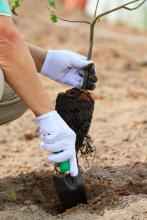
Many believers are familiar with the term “medical missions.” Less well known, though a growing awareness is popularizing the movement, is the field of environmental missions. The idea’s biblical base is to combine God’s creation care mandate with the additional call of Christ’s “great commission.” What that means and looks like and how it can be cultivated into fruition is the subject of Lowell Bliss’s new book, Environmental Missions: Planting Churches and Trees. Bliss is the director of environmental missions organization Eden Vigil.
The purpose of the newest category of missions, Bliss asserts, is two-pronged. The goal is to integrate the dual aims of the environmental missionary: to care for the environment and to make disciples. Why? Because God is a both/and God, not an either/or God. He cares for both people and the planet; he is concerned with saving both souls and soil. Following Jesus’ example, then, we can be both people and tree-huggers.
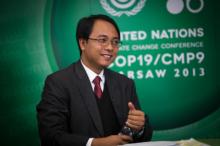
The latest United Nations climate summit got off to an unusually emotional start when Yeb Sano, the head delegate from the Philippines, issued a tearful plea at the opening plenary.
With his country ravaged by Typhoon Haiyan — the kind of extreme weather that experts say is becoming more common due to climate change — Sano choked back tears as he announced he would fast in solidarity for his countrymen left without food.
Sano said on Nov. 11 he would refrain from eating during the conference unless important progress was made. Sano’s gesture has so far failed to trigger much of a change in the entrenched negotiations, and with talks expected to stretch into the weekend, he is still on his hunger strike.

Many Christians these days are trying to consume less, and they’re doing so for a variety of reasons. For some, in the wake of the economic downturn, thrift is a simple necessity. Others, inspired by books such as Shane Claiborne’s The Irresistible Revolution, Jen Hatmaker’s 7: An Experimental Mutiny Against Excess strive for simplicity for the sake of the health of God’s creation and for the sake of our neighbors, both local and global, who must do without even the basic necessities of life. It’s no secret Americans spend — and waste — a lot.
But how do we begin to consume less? And once we become aware of the horrific conditions under which much of our stuff is made, how do we avoid being overwhelmed by all the injustice that may lie behind our new phone or pair of jeans? And even if we simplify by paring down our wants, what do we do when we actually need to buy something?
Here are some simple strategies to help you live lightly without being overwhelmed by it all.

Editor’s Note: This post contains two of many testimonies given at an Environmental Protection Agency listening session at EPA headquarters in Washington, D.C. The EPA held sessions in 11 regional offices across the country to allow the public to comment on the agency’s plans to begin regulating carbon dioxide emissions — one of the heat-trapping pollutants that contributes to climate change — from existing coal and natural gas-fired power plants. The public was invited to share up to three minutes of spoken testimony to an EPA panel for the agency’s consideration.
My name is Dr. Jalonne L. White-Newsome and I am a federal policy analyst at WE ACT for Environmental Justice, a 25-year-old community based environmental justice organization based in Harlem, N.Y. However, I work out of our Washington, D.C. office, mostly engaging in federal policy. Although I am in a different location, WE ACT D.C. has the same mission: to build healthy communities by insuring all voices help shape environmental policy and practices so that they are fair.
As a public health researcher who has seen the impacts of temperature, air pollution, and climate changes on urban-dwelling seniors in low income communities of color, I am clear about the need for and the importance of the testimony that I, and hopefully other environmental justice organizations, will offer here today. While three minutes is not a lot of time, I do have a couple of "calls to action" to uplift as you continue your work:
- Recognize the deficiency.
- Recognize the cumulative impacts.
As President Obama has pointed out, the climate issue is not only a technical one. In his words, “We have a moral obligation to future generations to leave them a planet that is not polluted and damaged.” We in the faith community would, of course, agree. But it is not only future generations that will bear the impacts of climate change. They are being felt now, most intensely by those populations around the world who are least able to cope with them. We must act with great conviction and haste to move toward solutions.
The central principle of the Bahá'í Faith is the oneness of humankind. This principle has deep implications for policy in many arenas. It should guide us to seek solutions that are equitable and just, treating all people as members of one human family. I believe that to be effective, the carbon standards established by EPA over the next several months must be animated by this foundational principle.
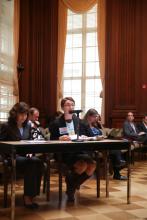
Editor’s Note: This post contains two of many testimonies given at an Environmental Protection Agency (EPA) listening session at EPA headquarters in Washington, D.C. The EPA held sessions in 11 regional offices across the country to allow the public to comment on the agency’s plans to begin regulating carbon dioxide emissions — one of the heat-trapping pollutants that contributes to climate change — from existing coal and natural gas-fired power plants. The public was invited to share up to three minutes of spoken testimony to an EPA panel for the agency’s consideration. We also have multiple other testimonies in parts two and three.
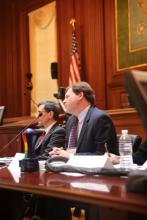
The Environmental Protection Agency held listening sessions Thursday to hear from the public about a forthcoming rule about carbon emissions from existing power plants. More than 20 faith leaders spoke on behalf of those Jesus called “the least of these.” In addition to such faith leaders as Rev. Dottie Yunger and Interfaith Power & Light’s Joelle Novey, other parties, from pro-coal Sen. Mitch McConnell, R-Ky., and coal lobbyist Mike Carey to the Sierra Club’s Leslie Fields and League of Conservation Voters’ Gene Karpinski, were on hand to testify. Those testifying had three minutes apiece to voice their views on what the new rule on emissions should look like.
Prior to the testimonies, more than 20 faith leaders assembled outside of the EPA to pray that God’s creation would be restored. Organized by Creation Justice Ministries and Greater Washington Interfaith Power and Light, the vigil featured songs of hallelujah and peace. Novey read a Jewish prayer for travelers, asking God to lead us into safety.
After the worship service, the faith leaders joined a diverse audience to testify to the EPA about the importance of battling climate change. I saw five faith leaders speak, reminding the agency that they not only have a technocratic responsibility to create a stringent rule limiting carbon emissions, but also a moral responsibility to do so.
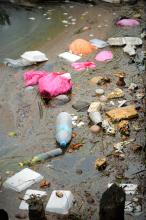
In the Hebrew and Christian scriptures, there is a Psalm that proclaims: “the earth is the Lord’s and everything in it, the world, and all who live in it” (Psalm 24:1). There is no part of this world that God is not aware of, cannot lay claim to, and does not rule. Christians affirm that as people of faith we’re called to be stewards over creation, answering one day for how we’ve treated the earth.
And part of that stewardship means understanding how this world works and what it needs in order to thrive. Unfortunately the din of our political ideologies has too often drowned out the biblical calling to care for creation.
In Texas, the State Board of Education will recommend new textbooks for all its students—and because it has such a large population, what they decide could determine what students in other states learn about science. There are several ideologues submitting textbook critiques to the board and their reviews will factor into each book’s overall score and likelihood of being approved by the school board. These ideologues could block the use of textbooks that teach the reality of climate change for the whole country’s public school students.
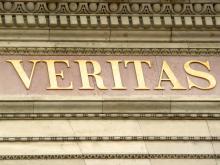
IF YOU WANT to understand why the climate movement missed Tim DeChristopher when he was in jail for two years, you should read the letter he sent recently to the president of Harvard.
Drew Faust—Harvard’s first female president—had just spoken for the establishment (really, the establishment establishment) by publishing a weary, soulless letter explaining that Harvard would not divest from fossil fuels despite the request of 80 percent of its student body. DeChristopher—who was imprisoned for two years after an inspired act of civil disobedience to block a drilling lease auction in his home state of Utah—had just arrived in Cambridge to start at Harvard Divinity School.
“Drew Faust seeks a position of neutrality in a struggle where the powerful only ask that people like her remain neutral,” DeChristopher wrote. “She says that Harvard’s endowment shouldn’t take a political position, and yet it invests in an industry that spends countless millions on corrupting our political system. In a world of corporate personhood, if she doesn’t want that money to be political, she should put it under her mattress. She has clearly forgotten the words of Paolo Freire: ‘Washing one’s hands of the conflict between the powerful and powerless means to side with the powerful, not to remain neutral.’ Or as Howard Zinn put [it] succinctly, ‘You can’t be neutral on a moving train.’”
DeChristopher is exactly right. Just as a tie goes to the runner, so “neutrality” goes to the status quo. And given that we’re in a full-on climate emergency—the Arctic melted last summer, for crying out loud—this kind of neutrality is no more admirable than defending the right of poor and rich alike to sleep beneath bridges.
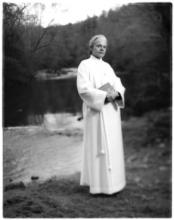
With her gray hair tied neatly in a bun and her wire-rimmed glasses perched thoughtfully on her nose, Ellen Davis looks the part of a distinguished Bible scholar.
Her resume certainly reads like one – a Ph.D. from Yale University and teaching appointments at Union Theological Seminary, Virginia Theological Seminary, Yale, and now Duke Divinity School.
Yet despite the traditional cast, Davis is leading a quiet revolution. For the past 20 years, she has been at the vanguard of theologians studying the biblical understanding of care for the land.
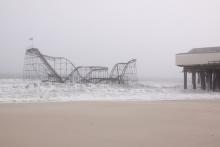
This week marks the one-year anniversary of Hurricane Sandy, the superstorm that decimated metropolitan areas of the East Coast last fall.
Damage from the storm resulted in more than 100 fatalities, with an estimated loss of $65 billion. Thousands of homes were lost, and millions were without power for days. Thousands of flights were canceled along the eastern seaboard, and multiple public transit services were suspended, including Amtrak and New York City’s bus and subway system. Even the U.S. economic structure ground to a halt, with NASDAQ and the New York Stock Exchange closing to buckle down before the deluge.
One year later, we reflect on reconstruction efforts post-Sandy. We also pause to assess the role of climate change, exacerbated by human actions, in the creation and severity of the storm.